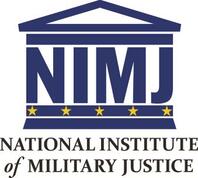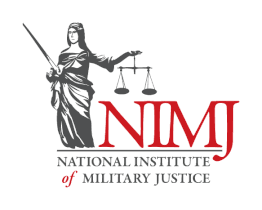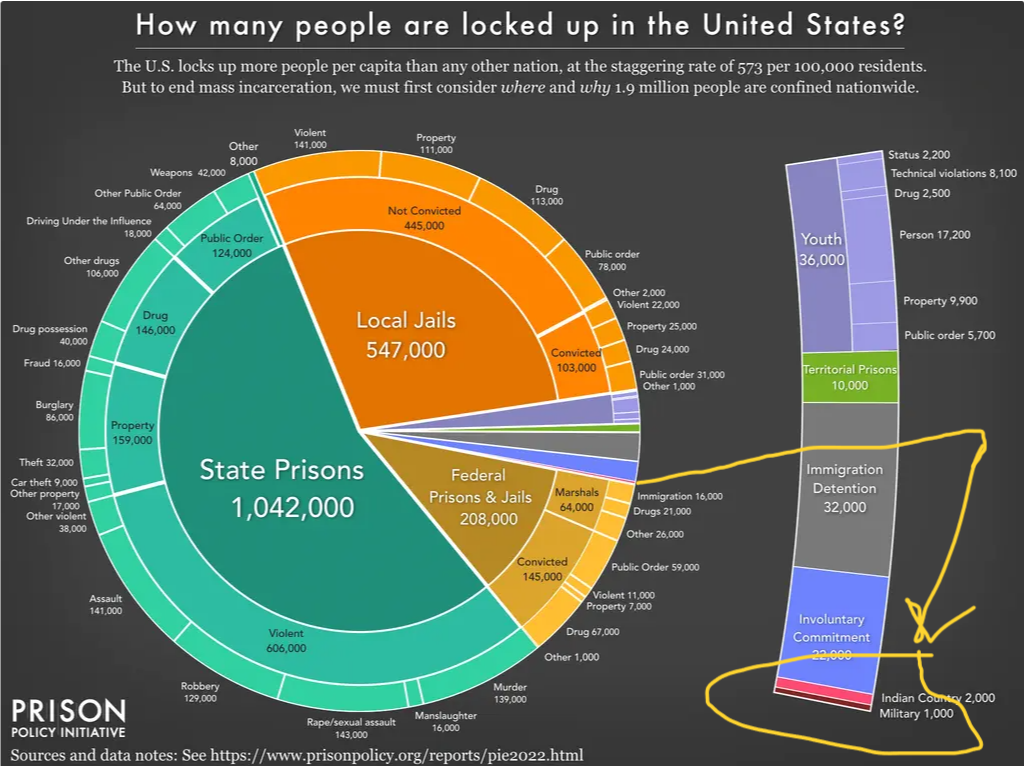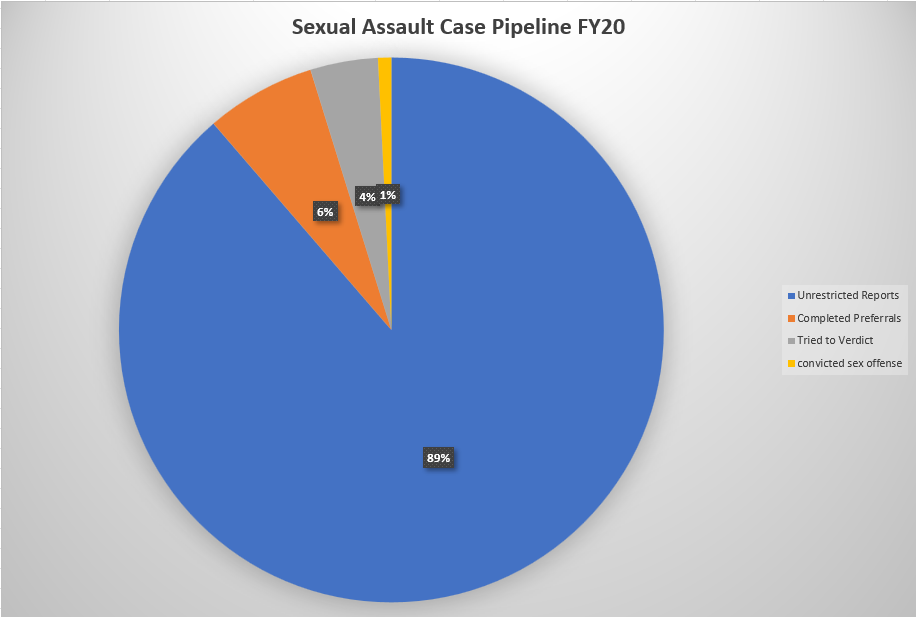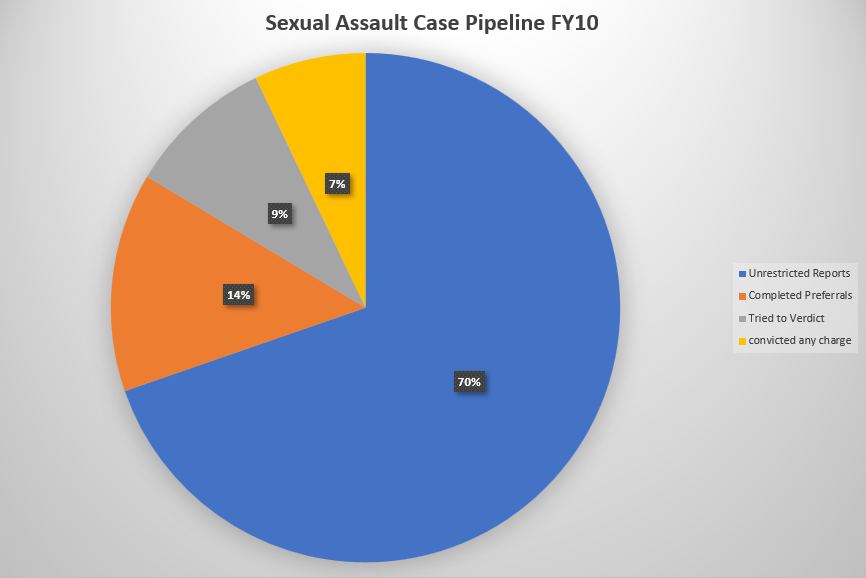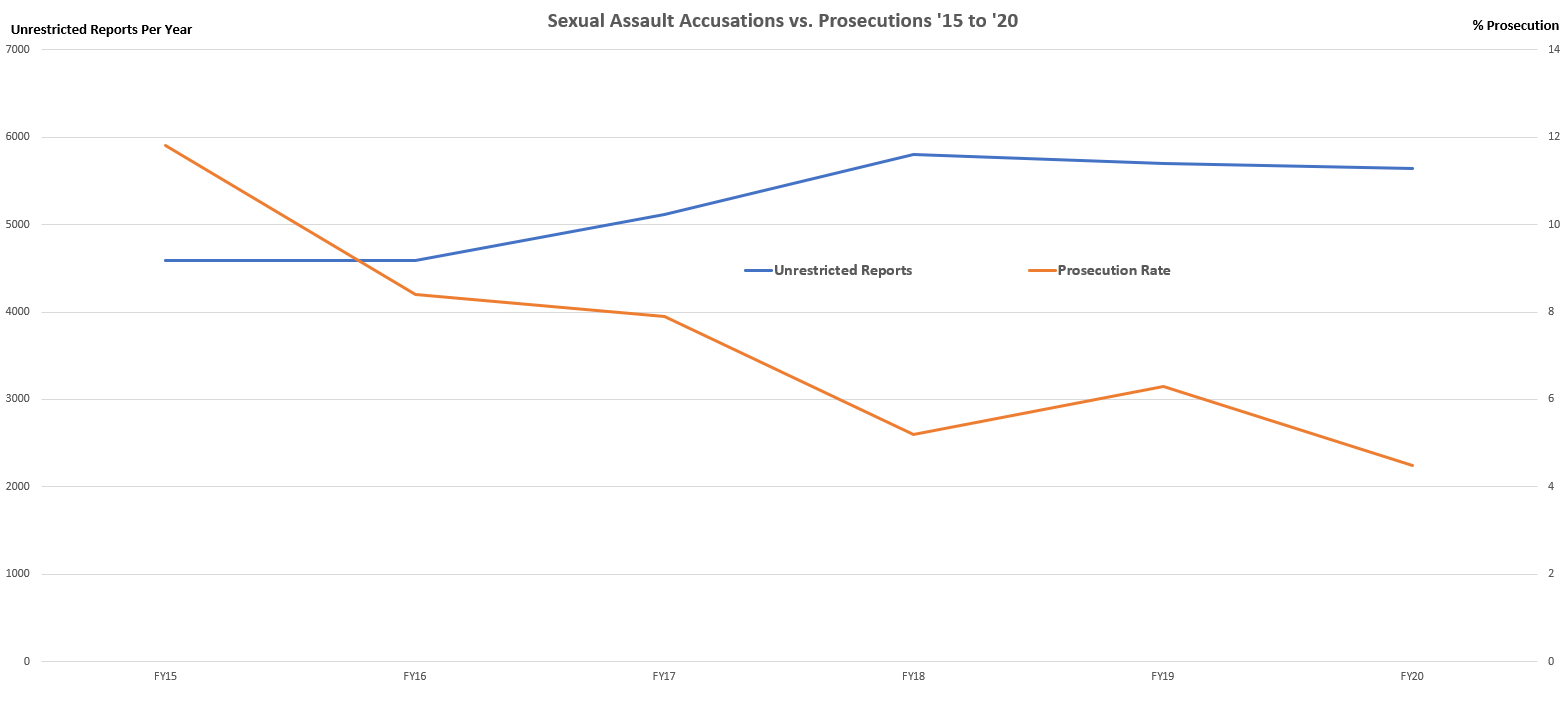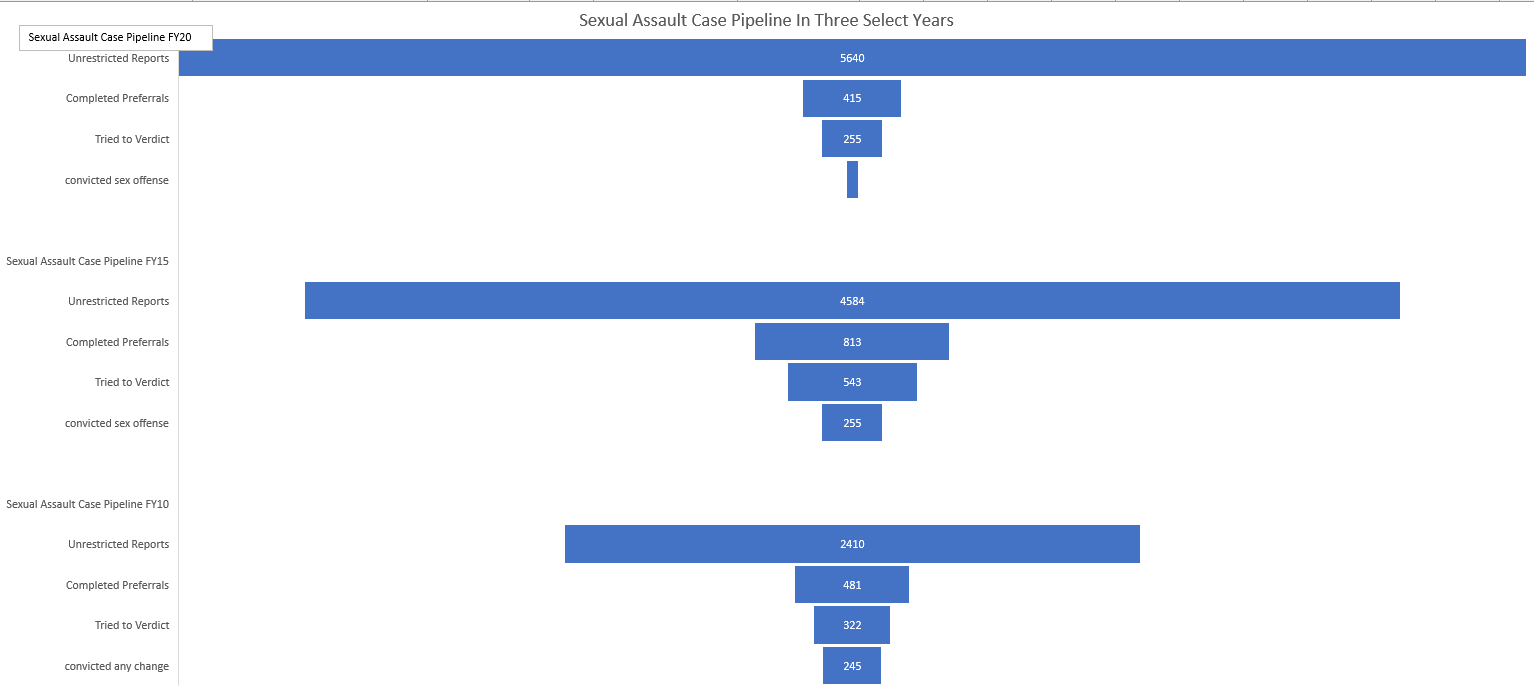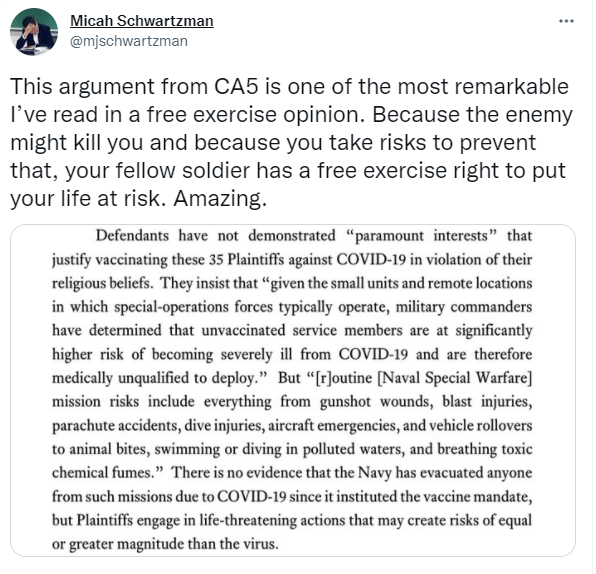"We are also asking that Congress support our efforts to take care of our most critical asset, our people. Our budget requests $479 million to implement the recommendations of the Independent Review Commission on Sexual Assault...."
Per the NYT this "would establish independent legal offices to handle sexual assault prosecutions within each branch of the armed forces." The conference on war crime accountability, jointly hosted by NIMJ and UVA Law, is fast approaching and will take place next Friday. Since organizing the conference, world events have made this topic more urgent and salient. Read the details here.
A few updates:
"No. 22-0098/AF. U.S. v. Chase M. Thompson. CCA 40019. On consideration of the petition for grant of review of the decision of the United States Air Force Court of Criminal Appeals, it is ordered that said petition is granted on the following issue:
DID THE COURT OF CRIMINAL APPEALS ERR BY REQUIRING THAT APPELLANT INTRODUCE DIRECT EVIDENCE OF HIS SUBJECTIVE BELIEF TO MEET HIS BURDEN FOR A REASONABLE MISTAKE OF FACT DEFENSE?" "The shock of invasion remains fresh and raw. And yet it must cede room for new shocks, for the quotidian tremors caused by reports that Russian troops have shelled homes and maternity hospitals, dropped cluster bombs on schools, seized nuclear plants, and forced more than 3 million Ukrainians to flee. This war is less than a month old, and yet already its criminality cries out for investigation, prosecution, and punishment of all responsible."
Read the full article here.
Sept. 11 Prosecutors Are in Plea Talks That Could Avert a Death-Penalty Trial
"Prosecutors have opened talks with lawyers for Khalid Shaikh Mohammed, the accused mastermind of the Sept. 11, 2001, attacks, and his four co-defendants to negotiate a potential plea agreement that would drop the possibility of execution, according to people with knowledge of the discussions." The Prison Policy Initiative today released their important annual report on mass incarceration in the United States. The Whole Pie 2022 reveals that military confinement is a negligible part of the whole, despite a jurisdictional population that is roughly the size of Kansas and is greater than a number of states. Brenner FissellEIC U.S. Supreme CourtWooden v. United States. The case is about the meaning of "occasion" under the Armed Career Criminal Act. It may have some relevance when deciding Quiroz type questions. The Courts of Appeals have divided over the meaning of ACCA’s “occasions” clause. Some Circuits, like the Sixth, deem the clause satisfied whenever crimes take place at different moments in time—that is, sequentially rather than simultaneously. Other Circuits undertake a more holistic inquiry, considering not merely the precise timing but also other circumstances of the crimes. We granted certiorari, 592 U. S. ___ (2021), to resolve that split of authority. The government argued that ten burglaries happening sequentially are ten offenses. We think not. The ordinary meaning of the word “occasion”—essentially an episode or event—refutes the Government’s single-minded focus on whether a crime’s elements were established at a discrete moment in time. And ACCA’s history and purpose do so too: The origin of the “occasions” clause confirms that multiple crimes may occur on one occasion even if not at the same moment. Wooden’s night of crime is a perfect case in point. His one-after-another-after another burglary of ten units in a single storage facility occurred on one “occasion,” under a natural construction of that term and consistent with the reason it became part of ACCA. Justices Sotomayor, Kavanaugh, and Barrett with Thomas, and Gorsuch joined by Sotomayor wrote separately to concur and so reached a unanimous decision.
Volokh Conspiracy take. Prof. Berman's take.
The Joint Service Committee has posted the court-martial numbers for last year. An initial analysis raises some important concerns and questions. Overall, the DoD did 1361 general and specials in FY21, slightly increasing from 1323 in FY20. However, this is still at historic lows. GCMs were up from 720 to 827, but specials fell from 603 to 534. Conviction rates continue to fall, with the defense winning a not guilty verdict in 22% of all GCMs and 17% of all courts. The Air Force continues to lead the way with an extremely high acquittal rate. There were 1129 convictions of some offenses, down from 1140 last year. 57% of convictions resulted in some type of punitive discharge. Again, the vast majority of cases were tried before a judge alone, with only 299 total courts being before members or 22%. Last year 21% of courts were tried before members. By service: The Air Force tried 199 GCMs and 143 SpCMS. The AF conviction rate for GCMs was only 55%, down from 69% last year. Its overall conviction rate was 67%. 45% of convictions resulted in a punitive discharge. Black airmen accounted for 21% of all GCMs and 31% of all specials. The Air Force has 85 ADCs, which works out to four courts per year per ADC and only one court per year with members. The Army tried 394 GCMs and 165 SpCMs. The Army conviction rate for GCMs was 81%, down from 83% last year. Its overall conviction rate was 85%. 60% of convictions resulted in a punitive discharge. Black soldiers accounted for 29% of GCMs and 36% of SpCMs. The Army has 26 AD judges and 23 reserve judges. That comes out to 20 courts per active-duty judge, less depending on how often reserves are used (it really makes one wonder why it took that Army judge 300 days to authenticate a record). There were only four member trials per active-duty Army judge in FY21. The Army has 150 TDS attorneys, less than four courts per year per defense counsel. The Army only had 111 courts with members, less than one per TDS attorney per year. The Navy tried 110 GCMs and 84 SpCMs. The Navy won 72% of the GCMs, down from 83% in FY20. Its overall conviction rate was 79%, with 58% resulting in a punitive discharge. Blacks accounted for 24% of GCMs and 33% of SpCMS. The Marines tried 124 GCMS and 142 SPCMs. The Marines won 85% of its GCMs, down from 92% in FY20. Their overall conviction rate was 86%, with 72% of convictions resulting in a punitive discharge. Blacks accounted for 19% of GCMS and 25% of SpCMs. The Navy and Marines have 25 judges, which works out to 18 courts per year per judge. As with the other services, that includes only about four members court a year for a judge. The data does not paint a picture of a healthy justice system. There are very few opportunities for counsel or judges to try cases, especially in front of members. In particular, the Air Force should be extremely concerned with a 55% conviction rate for GCMs.That should be raising all kinds of red flags. Are they prosecuting the wrong cases or not prosecuting the right ones well? Cultural issues? Something is not right. And likely, the data is worse than it appears. How many of the 1129 convictions are guilty pleas? How many of the remaining convictions are for minor offenses, not the serious charge that led to a court-martial. The real unanswered question is, how does the military do in litigated cases? We simply don't know. Lastly, Blacks are still prosecuted at a much higher rate than whites. Another sign the system is not healthy. (Update 09032022) Comments both to this post as well as others in the past posit that pressure from Congress to take sex assault and rape cases to court-martial are to blame for high acquittal rates. There have been those who claim that virtually all such allegations go to court because of undue pressure on commanders. This allegedly results in the system being overwhelmed by "weak" cases that would never be prosecuted by civilian authorities. These claims can be examined in light of the actual data. Each year, the DoD releases extremely detailed reports on allegations of adult sexual assault and rape cases including a summary of literally every case that proceeded to a court-martial with a charged Article 120 offense. The reports allow us to examine these claims objectively. From FY13 to FY20 there were 39,857 unrestricted reports of sexual assault or rape made to military authorities. Of those almost 40,000 reports, 3303 or 8.3% proceeded to court-martial with 1242 being convicted of an Article 120 offense or 3% of all reports. In other words, during the time of Congressional scrutiny, almost 92% of allegations were not prosecuted. Moreover, the rate of prosecution has dropped steadily during this time from a high of 12.8% in FY13 to a low of 3.9% in FY20. In raw numbers, the services prosecuted the most Article 120 adult cases in FY14 with 588 cases proceeding to court-martial that fiscal year. That number declined to 225 in FY20. Convictions for an Article 120 offense reached its height in FY15 when the military obtained 255 convictions. In FY20, the number of convictions dropped to 50. Some have also claimed the Air Force's low overall conviction rate is due to the Air Force being the most aggressive of the services when it comes to Article 120 cases. The data does not bear that out. In FY20, the Army prosecuted 5.1% of unrestricted reports, the Marines prosecuted 4.6%, the Air Force prosecuted 4.2% and the Navy prosecuted 3.9%. In other words the, Air Force is less likely, not more likely, to prosecute sexual assault cases than the military as a whole. Certainly, sex assault and rape are tough cases to try. However, the data simply doesn't support many assertions and beliefs people have about how often adult sexual assault allegations are prosecuted. Don ChristensenWill the government appeal the MJ's post-trial grant of a mistrial in United States v. Edwards? The findings and conclusions certainly seem defensible and as the MJ notes at the end, a retrial is allowed. It seems the evidence developed that one of the members may not have been completely candid on voir dire. When there is a question about a juror’s or member’s fairness and impartiality, the civilian and military appellate courts have made it clear that, when determining whether to grant a mistrial, the trial courts must consider the “appearance of fairness” and the public’s “perception” of the process. Commisso, 76 M.J. at 321. No. 22-0052/AR. U.S. v. Samuel B. Badders. CCA 20200735. On consideration of the petition for grant of review of the decision of the United States Army Court of Criminal Appeals on appeal by the United States under Article 62, Uniform Code of Military Justice, 10 U.S.C. § 862 (2018), it is ordered that said petition is granted on the following issue: WHETHER THE ARMY COURT HAD JURISDICTION OVER THIS GOVERNMENT APPEAL OF THE MILITARY JUDGE'S POST-TRIAL ORDER GRANTING A MISTRIAL. ACCA decision here. Post-trial, the military judge granted a mistrial and the government appealed. Tuesday, March 29, 2022
9:30 a.m.: United States v. Samuel B. BaddersNo. 22-0052/AR (Appellee)(Appellant)Counsel for Appellant: Terry Zimmerman, Esq. (supplement) ---------------------------- (reply) Counsel for Appellee: CAPT Dustin Morgan, JA, USA (answer) Case Summary: GCM conviction of sexual assault. Granted issue questions whether the Army Court had jurisdiction over this government appeal of the military judge's post-trial order granting a mistrial. (Update 08032022) Here is the SG's Application for a partial stay of the injunction in U.S. Navy SEALs v. Biden, et. al.
Updated (04032022) Prof. Vladeck had raised the issue in the following supplement to a petition for review in United States v. Scott, an AF case. Document here. The petition was denied March 3, 2022. Opening brief: https://justsecurity.org/wp-content/uploads/2022/02/Scott-USCA-Dkt.-No.-22-0084-AF-Supplement-to-Petition-for-Grant-of-Review-2-Feb-22.pdf… U.S. response: https://justsecurity.org/wp-content/uploads/2022/02/Scott-22-0084-AF-United-States-Answer-to-Supplement-to-Petition-for-Grant-of-Review-22-Feb-22.pdf… Our reply: https://justsecurity.org/wp-content/uploads/2022/02/Scott-USCA-Dkt.-No.-22-0084-AF-Reply-to-Governments-Answer-to-Supplement-to-Petition-for-Grant-of-Review-25-Feb-22.pdf On February 24, 2022, the ACCA specified this issue, WHETHER CONVICTIONS OF SERVICEMEMBERS WITHOUT A UNANIMOUS VERDICT FOR OFFENSES UNDER CLAUSE THREE OF ARTICLE, 134, UCMJ, IMPLICATES THE DUE PROCESS CLAUSE OF THE FIFTH AMENDMENT. Brief--Government Petition for Writ of Prohibition Brief--Government Supplement to the Writ-Petition Here is the brief in opposition to the Writ petition. Here are links to the POD amicus filings. Query: does United States v. Matthews, 16 M.J. 354 (C.M.A. 1983) have any relevance? United States v. Ferreira. ARMY MISC 20220034 (A. Cr. Crim. App. Jan. 28, 2022) The government has filed for and received a stay of proceedings in this case based on the "Dial" issue. The government also petitioned for a Writ of Prohibition. Likely the petition is similar to that filed in Dial. A petition has been filed in United States v. Dial, ARMY MISC 20220001 (A. Ct. Crim. App. Jan. 4, 2022).. A reader has suggested reviewing R. v. Thwaite, [2011] WLR 1125, [2010] EWCA Crim 2973, [2011] 1 WLR 1125, [2011] 1 Cr App Rep 19, [2011] 1 Cr App R 19. MAJ Hugh E. Henson, The Hung Jury: A Court-Martial Dilemma. 35 MIL. L. REV. 59 (1967). Defense Motion to Reconsider the Stay of Proceedings. ACCA Order granting a stay of proceedings. Government motion at ACCA for stay of proceedings. Links to the Defense motion and the Government reply.
Please join me and other NIMJ leaders for a case study on the Gallagher case with two of its participants: Chris Czaplack, the original lead prosecutor in the case, and Josh Vriens, one of the decorated military witnesses. Thursday, March 10 at 4:00 pm PT / 7:00 pm ET Registration and details here. For those interested, here is a link to the record of trial in United States v. Gallagher. Brenner FissellEIC Court of Appeals for the Armed ForcesBroadly speaking, Military Rule of Evidence (M.R.E.) 513(a) establishes a privilege that allows a patient to refuse to disclose confidential communications between the patient and his or her psychotherapist if those communications were made for the purpose of diagnosing or treating the patient’s mental or emotional condition. M.R.E. 513(d)(3) creates an exception to that privilege when a service regulation or state or federal law imposes a duty on the psychotherapist to report certain information derived from those communications, such as when the patient alleges child sexual abuse. We hold that this “duty-to-report” exception makes discoverable the information that was required to be reported to state authorities. We also hold, however, that the “duty-to-report” exception, standing alone, does not make discoverable the underlying confidential communications between the patient and the psychotherapist. In the instant case, we conclude that the lower court properly construed the psychotherapist-patient privilege and its exceptions, and that the military judge acted within his discretion in denying Appellant’s request for in camera review of the victim’s psychiatric records. We also conclude that Appellant was not denied the effective assistance of counsel. We therefore affirm the judgment of the United States Navy-Marine Corps Court of Criminal Appeals (NMCCA). Air Force Court of Criminal AppealsUnited States v. Barnes. GP to wrongful use of drugs and theft of military property. He was sentenced to three months, a Dismissal, and a reprimand. This is his second appearance after correction of post-trial errors. He had raised two issues of IAC. The court summarily affirmed the findings and sentence. The initial decision is here. United States v. Mcalhaney. GP to wrongful receipt of CP and possession and viewing of CP. He was sentenced to three months, a BCD, and a reprimand. There were two post-trial errors raised, and "whether an improper reprimand in Appellant’s case made his sentence inappropriately severe." He argues partly that "the reprimand issued by the convening authority is “unduly severe, inflammatory, inaccurate, and unsupported by the evidence in the record” and, consequently inappropriate and substantially prejudicial. Finding no error or prejudice the findings and sentence were affirmed. United States v. Mathis. GP to using drugs, DUI, and under age drinking, for which he was sentenced to 8 months, TF, RiR, and a BCD. Appellant raises two issues on appeal. The first is whether trial counsel’s sentencing argument was improper. The second is whether Appellant’s sentence was inappropriately severe. Of the three instances of alleged improper argument, the second and third drew this comment from the court, This is a close call in light of the CAAF’s conclusion in Hardison that recruitment documents pertaining to drug policy are generally not admissible as evidence in aggravation, and we encourage trial counsel not to push the limits on this front. If evidence that an accused signed an acknowledgement regarding a service drug-abuse policy is inadmissible as evidence in aggravation, the corollary would seem to be that it is inadmissible to argue that such evidence amounts to an aggravating factor warranting a higher sentence. United States v. Lowe. GP to an A&B on his spouse and divers A&B on spouse (a to be covered offense), for which he was sentenced to 60 days, RiR, and a BCD. The sole, Grosty, issue was IAC for failing to present and argue the appellant's PTSD diagnosis. It may not have been helpful that, Air Force investigators conducted interviews with Appellant’s family, co-workers, supervisors, and instructors, and found that Appellant had provided false information to his mental health providers regarding some of his experiences. Pending Appellate CasesUnited States v. Richard. Hope Hedge Seck, Coast Guard petty officer sentenced to six years in prison for daughter's crib death in Kodiak. Anchorage Daily News, February 11, 2022.
"No. 22-0091/AF. U.S. v. Javon C. Richard. CCA 39918. On consideration of the petition for grant of review of the decision of the United States Air Force Court of Criminal Appeals, it is ordered that said petition is granted on the following issue: WHETHER THE EVIDENCE OF PREJUDICE TO GOOD ORDER AND DISCIPLINE FOR THE ARTICLE 134, UCMJ, OFFENSES WAS LEGALLY SUFFICIENT." Comment: This is intriguing. Does anyone know what the conduct was? AFCCA decision. Appellant contends the Government failed to prove that the charged possession, distribution, and production of child pornography were prejudicial to good order and discipline in the armed forces. He notes that conduct punishable as prejudicial to good order and discipline under Article 134, UCMJ, “is confined to cases in which the prejudice is reasonably direct and palpable.” MCM, pt. IV, ¶ 60.c.(2)(a); see also United States v. Cendejas, 62 M.J. 334, 340 (C.A.A.F. 2006). Appellant suggests his conduct had little or no “nexus with the military . . . at all” because those involved, other than him, were civilians. United States Supreme CourtDo you have a medical provider accused of writing prescriptions unlawfully? The court has granted a petition on the following issue in Kahn v. United States, Whether a physician alleged to have prescribed controlled substances outside the usual course of professional practice may be convicted of unlawful distribution under 21 U.S.C. § 841(a)(1) without regard to whether, in good faith, he “reasonably believed” or “subjectively intended” that his prescriptions fall within that course of professional practice. Court of Appeals for the Armed ForcesUnited States v. Guyton. CJ Ohlson writes for himself and three others, with Sr. J. Cox dissenting in part but concurring in the judgment. This is an R.C.M. 707 and Sixth Amendment speedy trial case, focused on Army trial Rule 1.1 which automatically grants excludable delay between the time the case is docketed with the judiciary and arraignment. The granted issues in this case present two questions: (1) whether the Government violated Appellant’s right to a speedy trial under either Rule for Courts-Martial (R.C.M.) 707 or the Sixth Amendment of the United States Constitution; and (2) whether the United States Army Court of Criminal Appeals (CCA) erred by affirming a portion of Appellant’s sentence that had not been approved by the convening authority. We hold that there was no speedy trial violation here because the military judge did not abuse his discretion when he ruled that certain days were excludable for speedy trial purposes under R.C.M. 707, and he did not err when he ruled that Appellant could not prevail on his Sixth Amendment claim because Appellant demonstrated no prejudice pursuant to an analysis under Barker v. Wingo, 407 U.S. 514 (1972). However, we further hold that the CCA erred in affirming a sentence of forfeiture of all pay and allowances because the convening authority had not approved that particular portion of Appellant’s sentence. While finding in favor of Appellant on three Barker factors, the court again stresses that there must be actual prejudice. See Anderson, a post-trial delay case. United States v. Anderson. United States v. Anderson. Appellant requests that this Court determine whether his due process right to speedy post-trial review has been denied. After assessing the relevant factors, we conclude that Appellant’s due process rights have not been violated. A total of 497 days elapsed between the end of trial and the convening authority approving the sentence. Both parties agree that sixteen of those days are attributable to defense counsel’s review of the record, leaving 481 days of Government delay. The trial transcript was 635 pages long and included nineteen prosecution exhibits, eight defense exhibits, and thirty three appellate exhibits. Some comments received.
United States v. Simmons. (Note this is a 2016 MCM case.) A general court-martial consisting of officer members convicted Appellant of four specifications of sexual assault of a child, one specification of extortion, and one specification of producing child pornography. Appellant was sentenced to a dishonorable discharge, confinement for twelve years, forfeiture of all pay and allowances, and reduction to E-1. The granted issue, Whether the military judge erred in allowing the Government to make a major change to a specification, over defense objection—almost tripling the charged time frame—after the complaining witness’s testimony did not support the offense as originally charged and the prosecution had rested its case. The court decided that, We answer the granted issue in the affirmative. Specifically, we hold that under the totality of the circumstances presented here, enlarging the charged time frame of one of the offenses by 279 days—after arraignment and over defense objection—was “likely to mislead the accused as to the offenses charged.” Rules for Courts-Martial (R.C.M.) 603(a). 1 This amendment to the charge sheet thus constituted a “[m]ajor change” which the Government was not authorized to make without withdrawing, amending, and preferring the specification anew. R.C.M. 603(a), (d). Because the Government failed to take these required steps, the decision of the CCA is reversed as to the Specification of Charge II and as to the sentence. Judges Maggs and Hardy dissented. No. 21-0325/AR. U.S. v. Leeroy M. Sigrah. CCA 20190556. On consideration of the petition for grant of review of the decision of the United States Army Court of Criminal Appeals, it is ordered that said petition is granted on the following issue: WHETHER THE MILITARY JUDGE'S DENIAL OF APPELLANT'S R.C.M. 914 MOTIONS MATERIALLY PREJUDICED APPELLANT'S SUBSTANTIAL RIGHTS. ACCA opinion here. Note the decision is dated in June 2021. The issues at ACCA were the motion to strike testimony and Brady violations. The court agreed that the MJ erred in the Mil. R. Evid. 914 ruling, but it was not prejudicial but found the Brady issue waived. No. 22-0091/AF. U.S. v. Javon C. Richard. CCA 39918. On consideration of the petition for grant of review of the decision of the United States Air Force Court of Criminal Appeals, it is ordered that said petition is granted on the following issue: WHETHER THE EVIDENCE OF PREJUDICE TO GOOD ORDER AND DISCIPLINE FOR THE ARTICLE 134, UCMJ, OFFENSES WAS LEGALLY SUFFICIENT. Air Force Court of Criminal AppealsUnited States v. Davis. A GP case in which Appellant was convicted of using marijuana, cocaine, and LSD, and also wrongfully obtaining and distributing the names and social security numbers of other airmen. He was sentenced to 210 days and a BCD. This is a second visit after remand for post-trial issues. The issue then left to decide was unreasonable post-trial delay. Finding no prejudice the findings and sentence were affirmed. The original opinion is here.
In late 2021, Congress reformed the military justice system in a way that materially alters the traditional division of prosecutorial responsibility between nonlawyer military commanders and uniformed lawyers. That reform is consistent with trends among U.S. allies and the continued evolution of the American military justice system. To aid Congress in deciding whether further changes are warranted, steps should be taken now to gather data on the effect of the reform. Although the services remain surprisingly autonomous in the administration of military justice, it is critical that the data gathered reflect common standards, definitions and reporting periods across service lines. The Division of Authority Between the Special Trial Counsel and Commanders Under the Uniform Code of Military Justice: Planning Now for the Next Phase of Reform. Lawfare, February 28, 2022. Philip D. Cave, Don Christensen, Eugene R. Fidell, Brenner M. Fissell, Dan Maurer |
Links
CAAF -Daily Journal -Current Term Opinions ACCA AFCCA CGCCA NMCCA Joint R. App. Pro. Global MJ Reform LOC Mil. Law Army Lawyer Resources Categories
All
Archives
April 2022
|
||||||||||||||||||||||||||||||||||||||||||||||||||||
